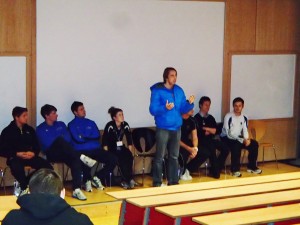
I was recently invited to Lincoln University to provide advice for Sports and Exercise Science undergraduates on preparing for the job market after graduation. UK graduates are currently facing a difficult job market, but there are ways to increase your chances of landing that first step towards your dream job.
Here’s some advice based on my own experiences;
Firstly don’t underestimate your own potential. As we know the competition for jobs is tough, but to be honest it as always been tough. If you keep focused on the opportunities and not on the barriers great things can happen.
Here are some tips on what to include in your job applications and also how you can go about meeting these requirements;
1. Highlight your relevant experience:
When applying for graduate jobs, try to think of examples of non-academic or coach education roles you have performed, such as holiday jobs, voluntary and work placements and even committee roles for university or local sports clubs. This will show you can adapt to different situations outside education.
This involves being proactive and searching for these opportunities. Most people find this is easiest whilst still at university and ideally in the first two years, before final exams and dissertations kick-in. If this is not possible don’t worry, but be prepared for how you are going to use your available time after graduation.
2. Talk about your strengths:
In your cover letter it helps to talk about what you are good at, what your strengths and relevant experiences are. This requires you to provide examples of transferable skills you have, and explain why you would be good for that particular role.
To help you do this at a later date record your activities, no need to write an essay, use short comments on what you have experienced and learnt during your voluntary placement. Don’t underestimate the value of your experience now, as you don’t know where they may fit in later (their true value for your future job). This will make recalling the information for your application a lot easier and goes a long way towards creating a strong application.
3. Begin to create a profile through social media activity, and try to gain exposure through online social media platforms:
Having a blog, a Facebook account and a Twitter account can definitely give you an advantage. Blogs and ‘tweets’ about your chosen field help you to get noticed, and can also help to build your professional reputation. Facebook is an excellent networking tool. If you set-up or join groups you will find it easy to meet and correspond with like-minded people.
One thing to remember though, your prospective employers will look at your blog, tweets and Facebook page, so make sure you keep it professional.
4. Prepare for your interviews:
Most companies now use the competency-based method of interviewing. The idea being that past performance is seen as the best indicator of future success. Although your relevant work experience may be limited, you will need to provide examples of your competencies. For example, testing your team ethic might look like, “Tell me about a situation where you have been part of a group working toward a specific goal.”
Not a problem though, because you thought ahead and as described in tip 2 you have instances like these to reflect on and use as examples. Remember it’s how you dealt with the situation, not necessarily the sporting discipline, that is important. What was your role in the group? The key is to describe the situation, outline the tasks and any challenges involved, the actions you took, and importantly, don’t forget to discuss the outcomes achieved (Remember to talk in the first person and describe the specific actions you took).
5. Finally, applying for roles on an individual basis:
When you apply for a position, make sure you edit your CV specifically for that role. And when you write your cover letter, write it in response to the advert, don’t send the same cover letter to everyone. If you do, they will know it is a generic letter and will be a lot less likely to respond.
I hope this helps. One thing I would like to say, it’s never too late; careers don’t always follow the path you originally envisaged
For additional graduate advice, visit Prospects or for more information and to access governing body qualifications and sports & exercise related job opportunities checkout: The British Association of Sport and Exercise Sciences (BASES) and Sports Coach UK.
You must be logged in to post a comment.